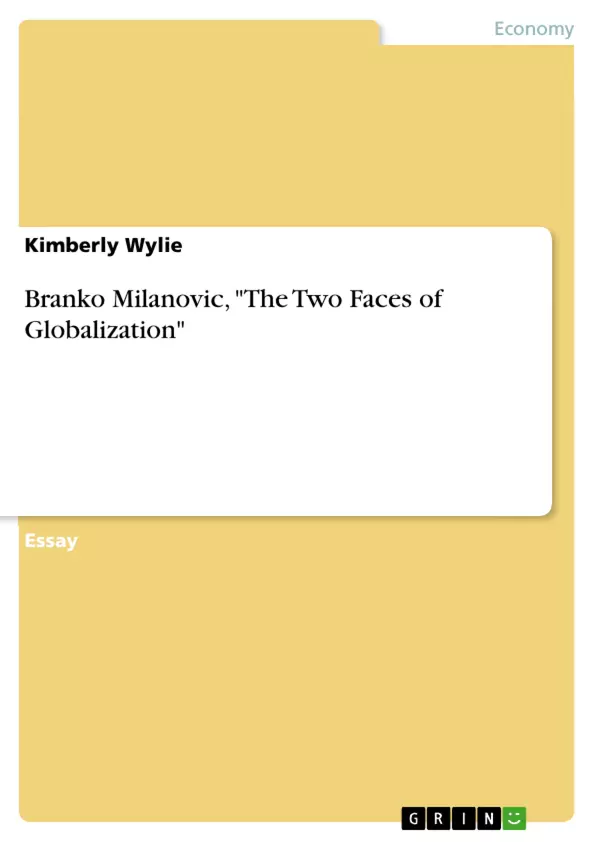In answering whether or not Milanovic’s (2003) ideas are correct that the dominant view of economists is that once certain preconditions are in place (′sound′ macro-policies, protection of property rights, etc.) ... the only thing a country needs to do is simply to open up its borders, reduce tariff rates, attract foreign capital, and in a few generations if not less, the poor will become rich, the illiterate will learn to read and write, and inequality will vanish as the poor countries catch up with the rich, (4) one must take into account how quickly popular opinion can change on a subject. I believe this was the dominant view of many economists, a short time ago, however, as the data continues to flow in on actual ‘real world’ results of globalization, more economists are realizing that it is not so simple.
Inhaltsverzeichnis (Table of Contents)
- Branko Milanovic, "The Two Faces of Globalization"
- In answering whether or not Milanovic's (2003) ideas are correct that the dominant view of economists is that
- Despite high tariff rates, thanks to lower overall costs of doing business, China has been able to compete globally in a variety of product and service industries.
- On the other end of the scale is pure, unadulterated capitalism without social conscience.
- If I were to share the one thing I learned from this course with an older, educated and intelligent adult, it would be the downside of globalization.
Zielsetzung und Themenschwerpunkte (Objectives and Key Themes)
The main objective of this work is to examine the arguments of Branko Milanovic regarding the two faces of globalization, analyzing the dominant view of economists regarding the impact of globalization on developing countries and its potential downsides.
- The dominant view of economists regarding globalization's impact on developing countries.
- The potential downsides of globalization, such as increased inequality and environmental degradation.
- The role of China as a case study in globalization's impact.
- The potential for tension and conflict between globalized and non-globalized societies.
- The importance of finding a balance between globalization and preserving local customs and cultures.
Zusammenfassung der Kapitel (Chapter Summaries)
- The first section delves into the dominant view of economists regarding globalization's impact on developing countries. It explores the idea that globalization, when properly implemented, can be a force for positive change, leading to economic growth, poverty reduction, and increased prosperity. However, it also acknowledges the complexities and challenges associated with globalization, questioning whether this view is overly simplistic and overlooks potential negative consequences.
- The second section focuses on the potential downsides of globalization. It highlights concerns regarding environmental degradation, increased inequality, and the tension between globalization and preserving local customs and cultures. The author emphasizes the importance of finding a balance between globalization and protecting the environment and cultural diversity.
Schlüsselwörter (Keywords)
The key terms and concepts discussed in this work include globalization, economic development, inequality, environmental impact, cultural diversity, China, and economic policy.
Frequently Asked Questions
What are the "two faces of globalization" according to Branko Milanovic?
The two faces refer to the optimistic view of economic growth and poverty reduction versus the reality of increased inequality and social tension.
What is the dominant view of economists regarding globalization?
The traditional view suggests that opening borders, protecting property rights, and attracting capital will inevitably lead to prosperity for poor countries.
Why does the author question the simplistic view of globalization?
Because real-world data shows that merely opening markets does not guarantee that inequality will vanish or that the poor will quickly become rich.
How is China used as a case study in this context?
China is noted for its ability to compete globally despite high tariff rates, showing that economic success depends on more than just low trade barriers.
What are the potential downsides of globalization mentioned?
Downsides include environmental degradation, loss of local cultural identity, and increased gaps between the rich and the poor.
- Quote paper
- Kimberly Wylie (Author), 2003, Branko Milanovic, "The Two Faces of Globalization", Munich, GRIN Verlag, https://www.grin.com/document/60677



